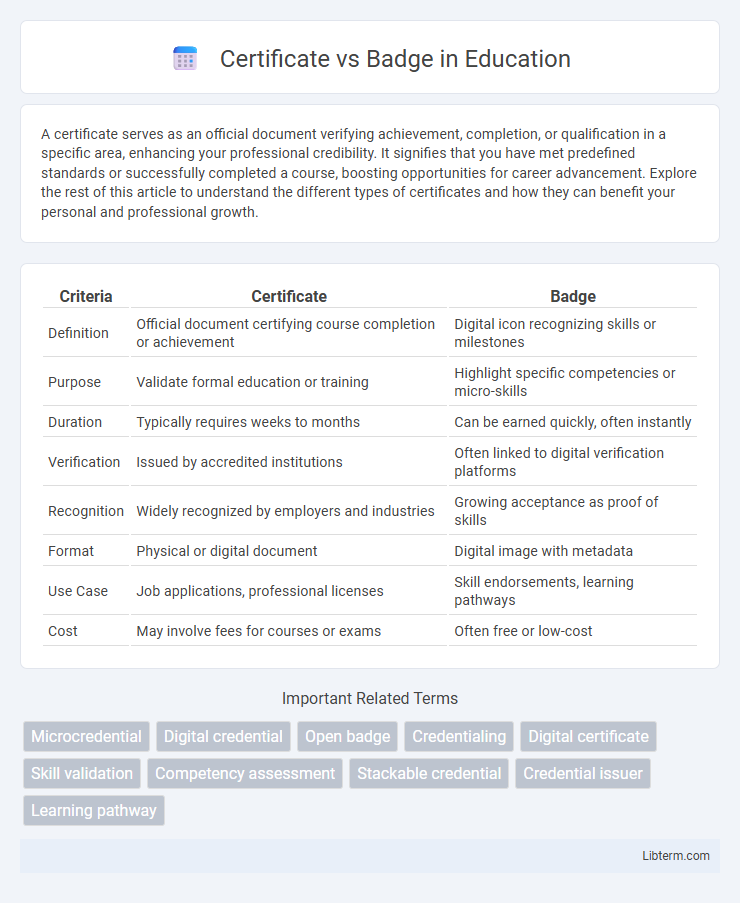A certificate serves as an official document verifying achievement, completion, or qualification in a specific area, enhancing your professional credibility. It signifies that you have met predefined standards or successfully completed a course, boosting opportunities for career advancement. Explore the rest of this article to understand the different types of certificates and how they can benefit your personal and professional growth.
Table of Comparison
| Criteria | Certificate | Badge |
|---|---|---|
| Definition | Official document certifying course completion or achievement | Digital icon recognizing skills or milestones |
| Purpose | Validate formal education or training | Highlight specific competencies or micro-skills |
| Duration | Typically requires weeks to months | Can be earned quickly, often instantly |
| Verification | Issued by accredited institutions | Often linked to digital verification platforms |
| Recognition | Widely recognized by employers and industries | Growing acceptance as proof of skills |
| Format | Physical or digital document | Digital image with metadata |
| Use Case | Job applications, professional licenses | Skill endorsements, learning pathways |
| Cost | May involve fees for courses or exams | Often free or low-cost |
Understanding Certificates and Badges
Certificates validate skills or course completion through formal documentation often issued by accredited institutions, serving as tangible proof for career advancement or educational achievements. Badges represent specific competencies or accomplishments through digital icons linked to metadata, enabling immediate verification and sharing across online platforms. Understanding the unique roles of certificates and badges aids individuals and organizations in recognizing and communicating qualifications efficiently in various professional and learning contexts.
Key Differences Between Certificates and Badges
Certificates typically represent the completion of a course or achievement of a formal milestone, often issued by educational institutions or professional organizations. Badges are digital or physical icons that signify specific skills or competencies, designed for easy sharing on social media or professional profiles. Unlike certificates, badges can be earned for micro-achievements and verified instantly through metadata embedded within the badge itself.
Purpose and Use Cases for Certificates
Certificates serve as formal documentation validating the completion of courses or achievement of specific skills, often used in professional and academic settings to demonstrate competence and credibility. They are essential for career advancement, job applications, and licensing requirements, providing recognized proof that supports eligibility for roles or further education. Common use cases include professional certifications, academic diplomas, compliance training, and skill verification in industries such as IT, healthcare, and education.
Common Applications of Digital Badges
Digital badges are commonly used in education and professional development to validate specific skills, micro-credentials, or achievements earned through online courses and workshops. Unlike traditional certificates that typically signify course completion, digital badges provide detailed metadata including issuer, criteria, and evidence, enabling easy verification and sharing across social media and professional networks. Employers and learning platforms increasingly adopt digital badges to recognize continuous learning and skills mastery in fields like IT, healthcare, and project management.
Recognition and Credibility: Which Holds More Value?
Certificates often carry higher recognition and credibility due to their formal issuance by accredited institutions, reflecting comprehensive achievement and skill mastery. Badges, while flexible and easily shareable in digital environments, mainly signify micro-accomplishments or specific competencies, appealing to modern learners and employers valuing continuous skill validation. In professional contexts, certificates tend to hold more value for career advancement, whereas badges enhance ongoing learning portfolios and niche expertise recognition.
Issuing Process: Certificate vs Badge
Certificates are typically issued after completing a formal assessment or course, involving verification by an accredited institution that ensures the learner meets specific standards. Badges are often awarded through digital platforms based on completed skills or micro-credentials, utilizing metadata to provide detailed evidence of achievements. The issuing process for certificates involves rigorous validation and printing or digital certification, while badges leverage blockchain or open standard technologies for instant, shareable recognition.
Digital Verification and Sharing Capabilities
Certificates provide verified credentials with official seals or signatures that authenticate achievement, making them ideal for formal recognition in professional or educational settings. Badges utilize digital verification through blockchain or secure online platforms, enabling instant validation and easy sharing across social media and professional networks. Both enhance credibility, but badges offer more dynamic sharing capabilities and real-time progress tracking.
Lifespan and Validity of Certificates and Badges
Certificates typically have a fixed expiration date or require renewal to maintain their validity, reflecting ongoing competence in a skill or qualification. Badges often represent achievements that do not expire but may lack formal recognition over time unless updated or combined with additional credentials. The lifespan of certificates is usually more structured and time-bound, while badges can serve as enduring digital proof of specific skills or milestones.
Which Option is Right for You?
Choosing between a certificate and a badge depends on your career goals and industry requirements. Certificates typically offer formal recognition with detailed credentials that can boost resumes and LinkedIn profiles, while badges provide portable, digital proof of specific skills or achievements suitable for tech-savvy environments. Evaluate if your target employers value in-depth qualifications or if demonstrating quick, verifiable skills through badges aligns better with your professional development strategy.
Future Trends in Digital Credentials
Digital credentials are evolving rapidly, with certificates becoming more secure through blockchain technology that ensures authenticity and tamper-proof records. Badges are gaining popularity as micro-credentials, offering granular recognition for specific skills and competencies in real-time, enhancing lifelong learning and career mobility. Future trends emphasize interoperability standards and decentralized digital wallets, enabling learners to easily share verified credentials across platforms and employers globally.
Certificate Infographic

 libterm.com
libterm.com